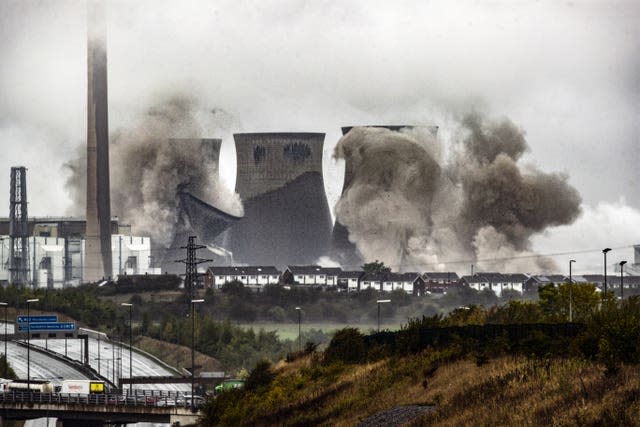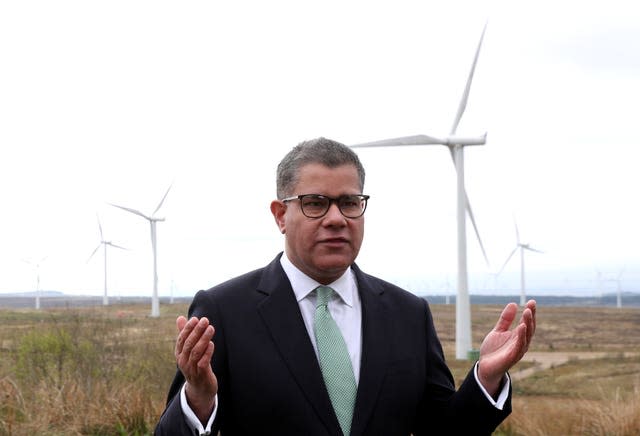End of era for coal power brought forward to October 2024, Government confirms
The UK will no longer use coal to generate electricity from October 2024 as part of moves to cut climate emissions from the grid, the Government has confirmed.
The move brings forward the phase-out for unabated coal power, which does not have technology to capture and permanently bury its carbon dioxide emissions, by a year from the originally scheduled date of October 2025.
The UK grid’s shift from coal towards a growing reliance on renewables has helped drive down emissions as part of the legal target to cut pollution to zero overall – known as net zero – by 2050, though meeting the goal now needs more efforts to clean up home heating, transport, industry and farming.

But ministers also hope the UK phase out of coal will send a signal to other countries that will help drive a global move away from one of the most carbon polluting fossil fuels to tackle climate change.
The Government confirmed in 2017 that it would regulate the closure of all the UK’s unabated coal power plants by October 2025, and in February last year Prime Minister Boris Johnson announced plans to bring forward the deadline to 2024.
That move has now been confirmed following a consultation earlier this year.
There are just three operational coal power plants in the UK, since the remaining coal units at Drax in North Yorkshire were mothballed in March, and all are already expected to close by October 2024.
Coal’s contribution to the power mix has dropped from around 40% less than a decade ago to just 1.8% last year, when the grid went 5,000 hours without coal-fired electricity and saw more than a third of the country’s power coming from wind.
Phasing out the fossil fuel for electricity generation spells the end to the era in which coal powered the grid that dates back to the world’s first coal power plant, on Holborn Viaduct in London, opening in 1882.
Energy and Climate Change Minister Anne-Marie Trevelyan said: “Coal powered the industrial revolution two hundred years ago, but now is the time for radical action to completely eliminate this dirty fuel from our energy system.
“Today we’re sending a clear signal around the world that the UK is leading the way in consigning coal power to the history books and that we’re serious about decarbonising our power system so we can meet our ambitious, world-leading climate targets.
“The UK’s net zero future will be powered by renewables, and it is this technology that will drive the green industrial revolution and create new jobs across the country.”
Alok Sharma, President of the international Cop26 climate summit which is being held in Glasgow in November, said: “The next decade will be make or break for our planet and the most powerful way we can make a difference is to end our reliance on coal.

“Ahead of Cop26, I hope the UK’s decisive step towards a cleaner, greener future sends a clear signal to friends around the world that clean power is the way forward.
“The impact of this step will be far greater if we can bring the world with us, and so our desire to support a clean and just energy transition is central to my discussions on the road to Cop26.”
Mr Sharma has previously said the United Nations climate summit, which aims to drive worldwide action to limit dangerous global warming, must consign coal power to history.
But the Government came under fire earlier this year for failing to step in to halt the go-ahead for a coking coal mine, for use in steel production, in Cumbria.
Ministers have now “called in” the planned mine to assess the application.
The phase-out is for electricity generation and does not include other uses of coal such as the steel industry or domestic coal mines.
Industry body Energy UK’s chief executive Emma Pinchbeck said: “Less than a decade ago more than 40% of our electricity generation came from coal, so it’s a remarkable achievement to reach this point.
“As we face the challenge of cutting emissions across the whole economy, the experience of the power sector shows that, with a clear direction and the right policies in place, we’ve been able to change quicker than anyone believed possible.
“What we need now is support for the rapid growth of renewables, and secure investment in other low-carbon sources to replace fossil fuels and ensure security of supply as we increase electricity demand for heat and transport.”
She called on the Government to provide long-term, stable policy that gave the industry and investors confidence.
Friends of the Earth energy campaigner Tony Bosworth said: “Although this is welcome news, coal was already fading into the history books.
“But ministerial boasts about taking radical action to completely eliminate this dirty fuel ring hollow while this Government is still sitting on the fence about a new coal mine in Cumbria.”

 Yahoo News
Yahoo News 
